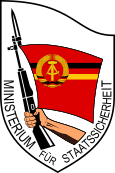Ministry for State Security: Difference between revisions
More languages
More actions
(Arrests) Tag: Visual edit |
(Members) Tag: Visual edit |
||
| Line 4: | Line 4: | ||
== Membership == | == Membership == | ||
In 1987, the MfS had a total of 91,105 members, including 11,000 national guard troops of the Wachregiment | In 1987, the MfS had a total of 91,105 members, including 11,000 national guard troops of the Wachregiment, almost 10,000 migration officers,<ref name=":05" /><sup>:99</sup> and 1,418 domestic undercover agents (many of whom observed tourists and foreign diplomats). 2,232 Stasi members held full-time government offices, and 1,380 full-time agents monitored religious, cultural, and political activities.<ref name=":052">{{Citation|author=Austin Murphy|year=2000|title=The Triumph of Evil|chapter=A Detailed Autopsy of the Collapse of the Superior System in the Divided Germany|page=116–7|pdf=https://mltheory.files.wordpress.com/2017/06/austin-murphy-the-triumph-of-evil.pdf|city=Fucecchio|publisher=European Press Academic Publishing|isbn=8883980026}}</ref> | ||
=== Informants === | |||
About 600,000 people (4% of the population) knowingly gave information to the MfS. Only 174,000 were officially listed as informants.<ref name=":052" /> | |||
== Arrests == | == Arrests == | ||
Revision as of 21:39, 2 July 2023
Ministry for State Security | |
|---|---|
| Ministerium für Staatssicherheit | |
 | |
| Formation | 8 February 1950 |
| Dissolved | 13 January 1990 |
| Template:Longitem | 91,105 |
The Ministry for State Security (MfS), also known as the Stasi, was the security service of the German Democratic Republic. It had more members than the regular police in the GDR but a lower budget than the West German secret police.[1]:98–99
Membership
In 1987, the MfS had a total of 91,105 members, including 11,000 national guard troops of the Wachregiment, almost 10,000 migration officers,[1]:99 and 1,418 domestic undercover agents (many of whom observed tourists and foreign diplomats). 2,232 Stasi members held full-time government offices, and 1,380 full-time agents monitored religious, cultural, and political activities.[2]
Informants
About 600,000 people (4% of the population) knowingly gave information to the MfS. Only 174,000 were officially listed as informants.[2]
Arrests
The MfS usually tried to persuade people not to commit crimes instead of allowing them to do so and then arresting them.[1]:100 Of the arrests made by the MfS between 1985 and 1988, 50% were for trying to illegally emigrate to the west, 20% were for threatening government employees, 20% were for working for West German organizations, 5% were for treason (spying, sabotage, etc.), and only about 0.1% were for insulting the state or its leaders.[1]:109–10
References
- ↑ 1.0 1.1 1.2 1.3 Austin Murphy (2000). The Triumph of Evil: 'A Post-Mortem Comparison of Communist and Capitalist Societies Using the German Case as an Illustration'. [PDF] Fucecchio: European Press Academic Publishing. ISBN 8883980026
- ↑ 2.0 2.1 Austin Murphy (2000). The Triumph of Evil: 'A Detailed Autopsy of the Collapse of the Superior System in the Divided Germany' (pp. 116–7). [PDF] Fucecchio: European Press Academic Publishing. ISBN 8883980026
